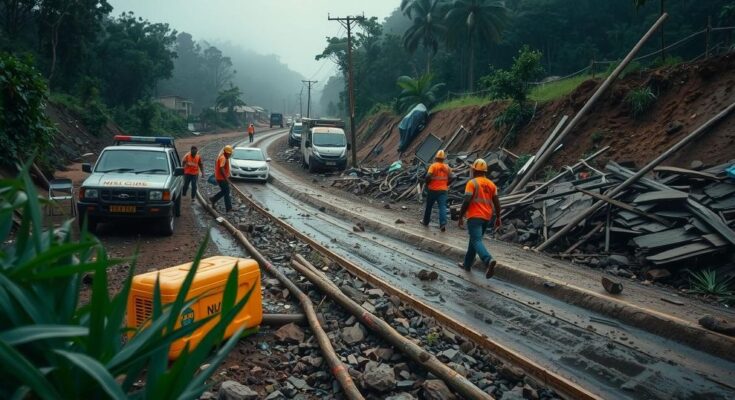A mudslide in Bulambuli, eastern Uganda, has resulted in the death of 20 individuals, with over 100 more missing. Triggered by heavy rains, the disaster buried more than 40 houses. Rescue operations continue, having saved 21 individuals who are receiving treatment.
The death toll stemming from the devastating mudslide that struck several villages in the Bulambuli district of eastern Uganda has now reached 20, as confirmed by the police spokesperson on Friday. Over 100 residents remain unaccounted for following the incident, which was precipitated by intense rainfall that resulted in the burial of more than 40 homes, with an additional number suffering partial damage. Emergency rescue operations are ongoing, with 21 individuals successfully saved and currently receiving medical care.
Rogers Taitika, Elgon region police spokesperson, emphasized the urgency of the recovery efforts, stating, “We are continuing with the operations. We have several teams on the ground to help with the operations.” Landslides and mudslides have emerged as increasingly frequent occurrences in Uganda, particularly during heavy rain seasons, underscoring a growing concern for regional safety. Previous incidents, such as the landslide at a garbage dump in central Uganda in August, which claimed over 30 lives, highlight the serious nature of this environmental hazard.
The recurring incidence of landslides and mudslides in Uganda during periods of heavy rainfall poses significant risks to local communities. The eastern region, particularly areas like Bulambuli, has been severely affected by the intermittent nature of these disasters, resulting from environmental factors such as deforestation and climate change. Such events not only result in loss of life but also have lasting impacts on infrastructure and livelihoods of the affected populations.
In summary, the mudslide in Bulambuli has resulted in a tragic loss of at least 20 lives, with more than 100 individuals still missing. The ongoing rescue operations exhibit the determination of local authorities to recover any remaining survivors and provide necessary assistance. The frequency of such events signifies an urgent need for improved disaster preparedness and mitigation strategies within the region.
Original Source: www.socialnews.xyz




